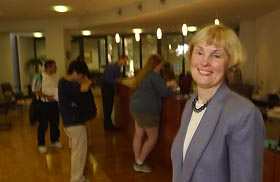|
This is an archived article.
For the latest news, go to the
Advance Homepage
For more archives, go to the Advance Archive/Search Page. | ||
|
New Vice Provost Is Advocate
For University's Research Mission By Elizabeth Omara-Otunnu When Janet Greger arrived at the University in June, the new vice provost for research and graduate education learned that her job had just gotten much harder. No sooner had she arrived than she was faced with the prospect of significant budget cuts, as the state's - and hence, UConn's - budget ran into difficulties. Still she remains positive. "I am an advocate for research," says Greger, an experienced researcher who holds a faculty position in nutritional sciences. "That means I am an advocate for faculty and graduate students and the research mission of the University."
Climate for Research
In fiscal year 2002, the University's Storrs-based programs received $86 million in grants and contracts, up from $68 million the year before. The largest source is federal support - $54 million. Yet, she says, UConn is receiving less funding than other major research institutions from the National Institutes of Health in particular, which has the largest budget of any federal funding agency. Modernizing Technology
"All schools are facing this, but we're in a particular bind," she says. "With growth are coming some demands that exceed our current systems." In addition, Greger plans to promote use of the existing technology, such as a computer program known as SPIN that lists thousands of funding sources. She is scheduling workshops to help research support staff and administrators become more aware of federal policies and grant opportunities, and to update them on services available through the Office for Sponsored Programs, the Office of Research Compliance, the Research Foundation, and Purchasing. The workshops are part of a plan to make all these units more responsive to faculty. Greger is also bringing together groups of researchers to respond to particular funding opportunities, and the Research Foundation and the UConn Foundation are working to identify funding sources for such interdisciplinary projects. One she already has in mind is HIV studies in Africa; others are mathematical modeling of biological and physical systems, environmental issues, and homeland security. She will welcome further ideas, she says. Collaborative Approach
Larry Hightower, a professor of molecular and cell biology and chair of the Research Advisory Council, says "There are certain things we must do to boost federal compliance, but beyond that, if cuts to Research Foundation programs and programs supervised by the Research Advisory Council are needed, Janet indicated she would be willing to listen to our views about what programs we value and where cuts could be made." Ensuring Compliance
"As we make the transition to being a major research university, with increased amounts of federal funding, regulations on compliance and accountability come more to bear," says Greger. "The time for deciding who goofed up is over. We need to think constructively for the future." She believes more information will help. Her office published a series of brochures in the summer that have been provided to new faculty and graduate students, and she has held a number of meetings on the issues. She emphasizes that the communication should not be all one way. "I welcome feedback on all issues," she says. "I will outline the current status, and then I will listen." Faculty members who have interacted with her says she's true to her word. "She's asking, collaborating, and consulting with faculty on committees, to get their input," says Charles "Skip" Lowe, professor and head of the psychology department. Graduate Education
Here, too, she relies on statistics to analyze the current picture and begin to shape the future. "We need to out-compete other schools to get the best and brightest graduate students," she says. Data from fall 2001 show that the University has more than 5,300 graduate students and 1,000 graduate faculty members in 65 doctoral and 70 master's programs. But the statistics are incomplete, she says, and much of the data is gathered by departments rather than University-wide. "We don't have a good understanding of why some graduate students don't come here after they've received an offer," she notes, "or about the time-to-degree of graduate students, or what they do after they leave here." She says it is important to improve the statistics in order to improve the programs: "Better statistics will make us more eligible for training grants and a variety of foundation supports." The PeopleSoft system will help, but still, she says, "it will be a multi-year building process." She plans to work with the Graduate Faculty Council to strengthen graduate programs and the infrastructure that supports them. Benefits for Undergraduates
"Graduate education and research and really good undergraduate education are inextricably linked," she adds. "Students are learning not from professors who are just giving out information from a book, but from the people who helped create the data." Theory and Practice
Still, those who attend events hosted by the nutritional scientist should not expect doughnuts and Danish. Instead, she promises, she will serve celery, carrot sticks, and cheese cubes. This article is part of an occasional series about the University's academic administrators. |

